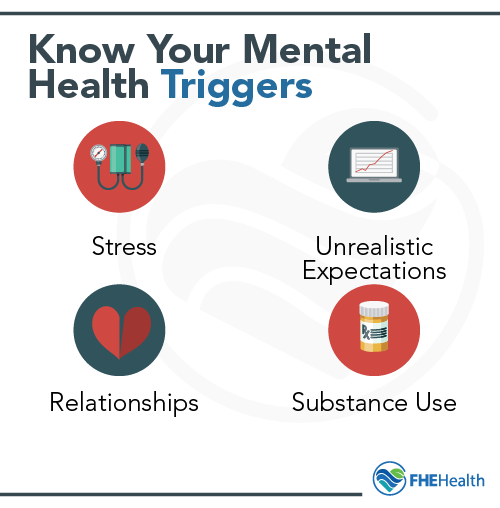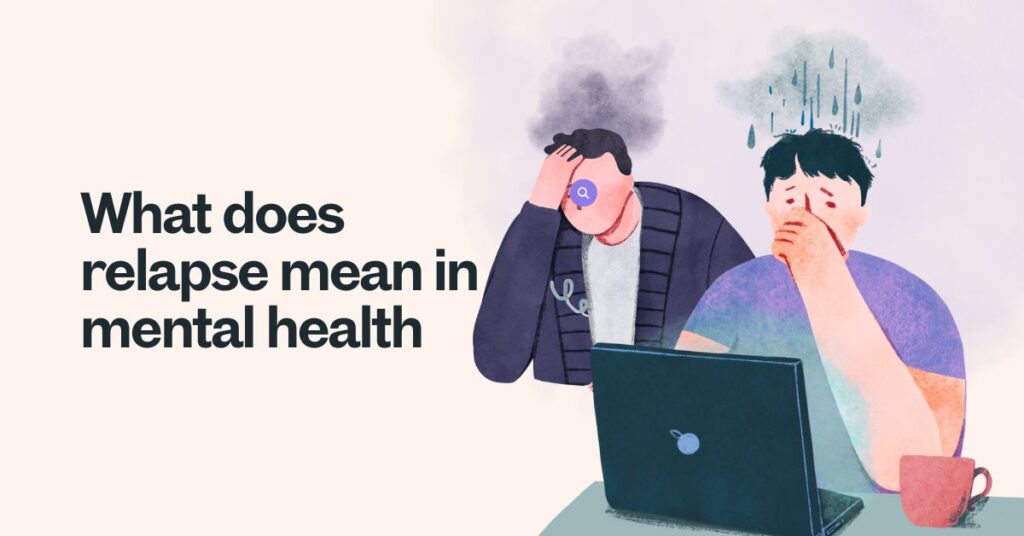Relapsing in mental health means returning to a previous state of illness. It can be scary and confusing.
Mental health recovery is often a journey with ups and downs. Just when things seem to be improving, relapses can occur. This term signifies a temporary setback where symptoms reappear. Relapsing is common and can happen to anyone dealing with mental health issues.
It’s not a sign of failure but a part of the recovery process. Understanding what relapsing means, its signs, and how to cope is crucial. Knowing these can help individuals and their loved ones manage the situation better. In this blog, we will explore what relapsing means in mental health, its causes, and ways to handle it.
Topic of Contents
ToggleIntroduction To Relapsing
Relapsing in mental health means returning to old behaviors after a period of improvement. It often involves re-experiencing symptoms. Recognizing signs early can help manage and prevent relapse.
Relapsing is a term often used in mental health discussions. Understanding its true meaning is crucial. Relapse can affect anyone. It doesn’t mean failure. It means a temporary setback.
Definition Of Relapse
Relapse in mental health means returning to old symptoms or behaviors. These symptoms had previously improved. It can be unexpected and distressing. Recognizing the signs early can help. Early intervention can prevent further decline.
Common Misconceptions
Many believe relapse means treatment has failed. This is not true. Relapse is a common part of recovery. It doesn’t mean starting from scratch. Some think only weak people relapse. This is a harmful myth. Relapse can happen to anyone. It is not a sign of weakness. Understanding these points is key. Relapsing is part of the journey. It offers a chance to learn and grow. “`
Causes Of Relapse
Relapse in mental health is a return to previous unhealthy behaviors. Understanding the causes can help in prevention. Key factors include triggers and stressors, as well as biological elements.
Triggers And Stressors
Triggers and stressors are events or situations that provoke mental health issues. They can be external or internal.
- External Triggers: These include work stress, relationship problems, or financial issues.
- Internal Triggers: Negative self-talk, unresolved trauma, and low self-esteem.
Stressors can cause significant mental strain. This strain can lead to relapse. Recognizing these stressors helps manage and reduce their impact.
Biological Factors
Biological factors also play a role in relapse. These include genetic predispositions and brain chemistry.
| Factor | Description |
|---|---|
| Genetic Predispositions | Some people are more prone to mental health issues due to their genes. |
| Brain Chemistry | Imbalances in brain chemicals can trigger a relapse. Neurotransmitters like serotonin and dopamine are crucial. |
Understanding these biological factors can aid in developing better treatment plans. Medical professionals can tailor interventions to the individual’s needs.
Early Warning Signs
Recognizing early warning signs of relapse in mental health is crucial. Awareness can help in timely intervention and support. Here are some key indicators to watch out for:
Behavioral Changes
Behavioral changes are often the first signs of a mental health relapse. These changes can include:
- Withdrawal from social activities
- Neglecting personal hygiene and self-care
- Decreased productivity at work or school
- Increased use of substances such as alcohol or drugs
Behavioral changes might seem minor at first. But they can escalate quickly if not addressed. Pay close attention to these shifts.
Emotional Indicators
Emotional indicators can also signal a potential relapse. These might include:
- Heightened irritability or anger
- Persistent sadness or hopelessness
- Anxiety or excessive worry
- Mood swings or emotional instability
Emotional changes can be subtle. Yet, they are significant in understanding one’s mental state. Being aware of these signs can lead to early and effective support.
:max_bytes(150000):strip_icc()/what-is-relapse-22106_final1-95caf6838312493fa95aecfc15aefbe4.png)
Impact On Mental Health
Relapsing in mental health can have a significant impact. It often disrupts progress and can lead to feelings of failure. The effects are not just emotional, but social as well. Below we explore the emotional toll and social consequences of relapsing.
Emotional Toll
Relapsing can be emotionally draining. Individuals may feel disappointed in themselves. This can lead to increased feelings of guilt and shame. They might think they have let themselves or others down. Negative emotions can spiral, causing anxiety and depression to worsen.
It is common to feel hopeless after a relapse. Many lose motivation and struggle to find the strength to continue their recovery journey. The emotional strain can create barriers to seeking help or sticking to treatment plans.
Social Consequences
Relapsing also affects social interactions. Friends and family may struggle to understand the situation. This can lead to strained relationships. The individual might isolate themselves, avoiding social activities.
Work and school performance often suffer. Attendance can become inconsistent, and productivity may drop. This can result in further stress and social withdrawal.
Support networks can weaken, making recovery more difficult. It is crucial to rebuild these connections for long-term healing.
Prevention Strategies
Relapsing in mental health can be a challenging experience. Yet, prevention strategies can help manage and reduce the risk of relapse. These strategies empower individuals to maintain their mental wellness. Key prevention strategies include adopting healthy coping mechanisms and building strong support systems.
Healthy Coping Mechanisms
Healthy coping mechanisms play a crucial role in preventing relapse. Techniques such as mindfulness, deep breathing, and meditation can help manage stress. Regular physical activity is another effective way to cope with mental health challenges. Exercise releases endorphins, which improve mood and reduce anxiety.
Journaling can also serve as a healthy outlet for emotions. Writing down thoughts and feelings helps in identifying triggers and patterns. This awareness enables individuals to develop better coping strategies. Additionally, maintaining a balanced diet and getting sufficient sleep contribute to mental well-being.
Support Systems
Strong support systems are vital in preventing relapse. Surrounding oneself with caring and understanding individuals provides emotional stability. Friends, family, and mental health professionals can offer valuable support. They can provide encouragement and guidance during difficult times.
Support groups also offer a sense of community. Sharing experiences with others facing similar challenges can be comforting. It helps individuals feel less isolated and more understood. Professional therapy or counseling can offer personalized strategies and support tailored to individual needs.

Treatment Options
Relapsing in mental health can be challenging. Knowing the right treatment options makes a big difference. These options help manage symptoms and prevent further relapses. Let’s explore some effective treatments.
Therapy Approaches
Therapy is a common and effective treatment. Cognitive Behavioral Therapy (CBT) is popular. It helps patients change negative thought patterns. Another approach is Dialectical Behavior Therapy (DBT). DBT teaches coping skills and emotional regulation. Both therapies offer structured support.
Group therapy is another option. It provides a sense of community. Patients share experiences and learn from each other. Support groups can be powerful in reducing isolation. They offer a safe space to discuss challenges.
Medication Management
Medication plays a crucial role in treating mental health issues. Antidepressants, mood stabilizers, and antipsychotics are common. These medications help manage symptoms. They can prevent relapses when taken as prescribed.
A psychiatrist usually prescribes and monitors medication. Regular check-ins are essential. They ensure the medication is working well. Adjustments may be needed over time. Consistent medication management can significantly improve outcomes.
Role Of Support Networks
Relapsing in mental health signifies a setback in recovery. It’s a common part of the journey. Support networks play a crucial role. They provide the necessary emotional and practical help. These networks include family, friends, and community resources. The right support can make all the difference.
Family Involvement
Family involvement is vital in recovery. Families offer unconditional love and understanding. They create a safe environment for the individual. They help in recognizing early signs of relapse. This way, they can take immediate action.
Family members can attend therapy sessions too. This helps them understand the condition better. They learn how to provide the right support. Open communication within the family is essential. It builds trust and reduces feelings of isolation.
Community Resources
Community resources are invaluable. They offer various programs and services. These include support groups, counseling, and educational workshops. They provide a sense of belonging. Connecting with others who share similar experiences is comforting.
Local organizations often run these programs. They offer assistance tailored to individual needs. Community resources also provide information on coping strategies. They help individuals and families navigate the recovery process.
:max_bytes(150000):strip_icc()/VWH_Illustration_Relapse-Prevention-Strategies_Illustrator_Jiaqi-Zhou_Final-bc8a75a6c5544a54b91872aef57a0598.jpg)
Personal Stories
Understanding the concept of relapsing in mental health can be challenging. Personal stories help shed light on this complex topic. They offer real-life experiences and insights. These narratives can inspire and educate others facing similar struggles. Let’s dive into some powerful personal stories of relapse and recovery.
Case Studies
Jane’s journey with depression was long and difficult. She had periods of improvement followed by unexpected setbacks. Each relapse taught her more about managing her condition. Jane learned that seeking help early could prevent a full relapse.
Tom battled anxiety for years. He experienced a severe relapse after a stressful event. This setback motivated him to try new coping strategies. Tom found that regular therapy sessions and mindfulness exercises were crucial. His case shows that relapses can lead to better understanding and new approaches.
Recovery Journeys
Mary struggled with bipolar disorder. Her relapses were frequent and severe. Over time, she discovered the importance of a strong support system. Family and friends played a crucial role in her recovery journey. Mary’s story emphasizes the value of support networks in managing relapses.
David faced addiction and had multiple relapses. Each time, he felt defeated. But he never gave up. David’s recovery journey involved joining a support group and finding a mentor. These steps provided him with the strength to stay on track. His persistence highlights the importance of community and guidance in overcoming relapses.
These personal stories illustrate that relapses are part of the recovery process. They show that with the right strategies and support, individuals can find their way back to health. Sharing these experiences helps reduce stigma and offers hope to many.
Frequently Asked Questions
What Does Relapsing Mean In Mental Health?
Relapsing means returning to old behaviors or symptoms after a period of improvement.
How Common Is Relapse In Mental Health?
Relapse is common. Many people experience setbacks in their mental health journey.
What Triggers A Mental Health Relapse?
Stress, lack of support, and not following treatment can trigger a relapse.
Can Relapse Be Prevented In Mental Health?
Yes, with proper treatment, support, and self-care, relapses can often be prevented.
How To Handle A Mental Health Relapse?
Seek help from a mental health professional. Revisit your treatment plan and support system.
Conclusion
Understanding relapsing in mental health is crucial for effective recovery. It helps in recognizing early signs and seeking timely help. Relapse is not a failure, but a part of the journey. Support systems and coping strategies play a big role.
Consistent self-care and professional guidance make a difference. Stay informed, stay strong, and prioritize mental health. Remember, progress is not always linear. Every step forward counts. Keep moving, keep healing.







